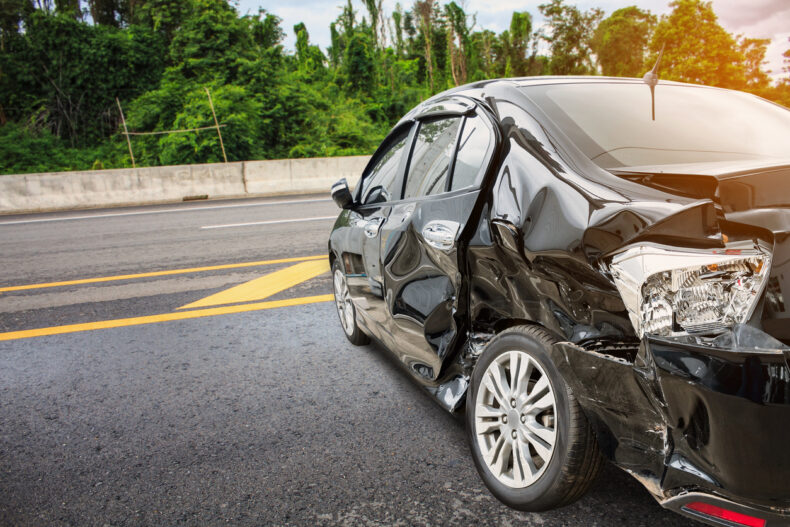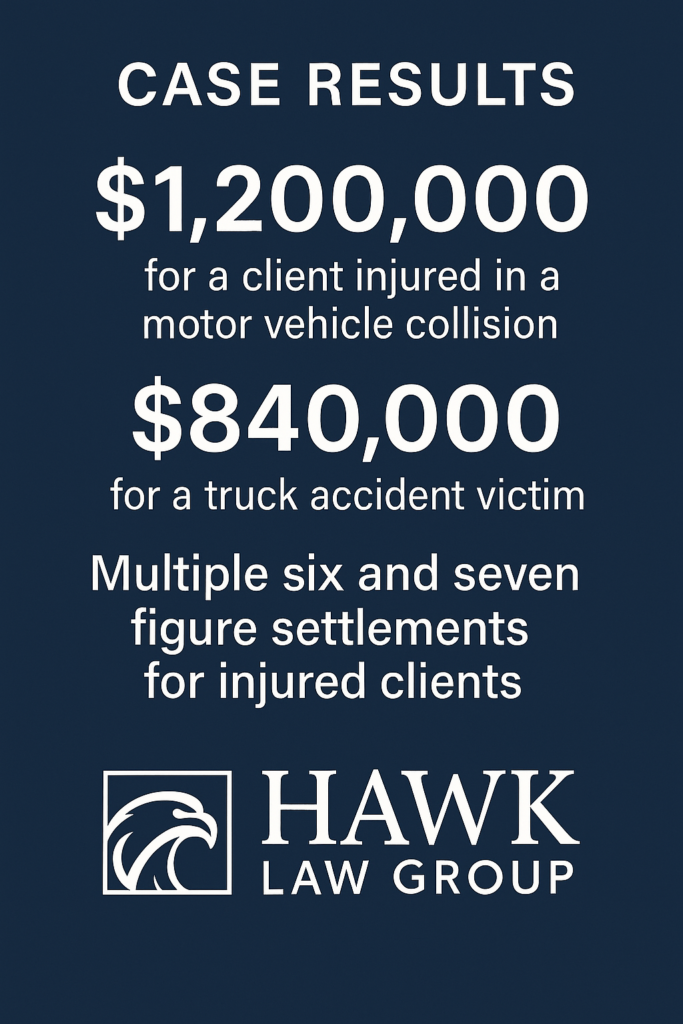Hawk Law Group | May 25, 2025 | Car Accidents

Brake checking represents one of the most dangerous forms of road rage behavior on Georgia highways.
This aggressive driving tactic not only violates state traffic laws, but also creates devastating rear-end collisions that leave innocent drivers facing serious injuries and complex legal battles.
At Hawk Law Group, our 71+ years of combined experience have taught us exactly how to prove fault in these challenging cases. For a free case review with our Georgia and Aiken Car Accident Lawyers hit the link below. Or continue reading for more information on this topic.
What Is Brake Checking?
Brake checking is when the front driver quickly and aggressively presses on their brakes out of nowhere. Drivers often brake check to scare or shock the drivers behind them.
It is common for drivers to brake check as punishment to rear drivers who are tailgating them. Tailgating means a driver leaves little distance between their vehicle and the vehicle in front of them, failing to provide enough room should the front vehicle stop suddenly. Reckless and aggressive drivers often brake check as well.
Brake checking is dangerous and can result in unfortunate collisions.
Common Brake Checking Scenarios
Highway Merge Situations: A driver becomes frustrated when another vehicle merges ahead of them and responds by brake checking to “teach them a lesson.”
Road Rage Incidents: Following a perceived slight, such as being cut off or honked at, drivers may brake check as retaliation.
Tailgating Response: While tailgating is dangerous, brake checking as a response creates an even more hazardous situation.
Hypothetical Example: In a typical case, a client might suffer severe whiplash when a driver brake checks after a minor lane change dispute. The at-fault driver’s insurance often initially denies liability, claiming the victim was following too closely. Through dashcam evidence and expert testimony, such cases can result in significant settlements.
Is Brake Checking Legal in Georgia?
Brake checking is illegal under Georgia law. Georgia Code § 40-6-49 requires drivers to maintain reasonable following distances and prohibits actions that create unnecessary hazards on the roadway.
Legal Consequences of Brake Checking
| 📋Violation Type | 💰Potential Penalties | 📈Insurance Impact |
|---|---|---|
|
Reckless Driving
|
Up to $1,000 fine
Up to 12 months jail time
|
Premium increases 20-40% |
|
Aggressive Driving
|
$300-$5,000 fine
Points on license
|
License suspension possible |
|
Criminal Charges
|
Felony if serious injury occurs
Permanent criminal record
|
Policy cancellation risk |
The Georgia Department of Driver Services maintains strict penalties for aggressive driving behaviors, including brake checking incidents that result in accidents.
Types of Accidents Caused by Brake Checking
Rear-End Collisions
Approximately 87% of brake checking incidents result in rear-end collisions, according to data from the Georgia Governor’s Office of Highway Safety. These crashes often involve:
- High-speed impacts with minimal braking time
- Multiple vehicle pile-ups on busy highways
- Severe property damage to both vehicles
Multi-Vehicle Chain Reactions
On Interstate 20 through Augusta or I-520 around Evans, brake checking can trigger devastating chain-reaction crashes involving multiple innocent drivers.
Hypothetical Scenario: During morning rush hour traffic on Washington Road near Augusta University, Driver A brake checks Driver B after a lane change. Driver B rear-ends Driver A, but the sudden stop also causes Drivers C and D to collide. What started as one person’s road rage now involves four vehicles and potentially serious injuries to multiple families.
Common Injuries in Brake Checking Accidents
Immediate Impact Injuries
Whiplash and Neck Trauma: The sudden deceleration-acceleration cycle creates severe cervical spine stress, often requiring months of physical therapy and pain management.
Traumatic Brain Injuries: When occupants’ heads strike steering wheels, dashboards, or windows during brake checking collisions, the results can include concussions, memory loss, and cognitive impairment.
Spinal Cord Damage: The violent forward-backward motion can compress or damage spinal discs, potentially causing permanent mobility issues.
Long-Term Consequences
Our clients often experience:
- Chronic pain requiring ongoing medical treatment
- Lost wages from extended recovery periods
- Emotional trauma and anxiety about driving
- Permanent disability in severe cases
Hypothetical Scenario: A 34-year-old teacher from Thomson encounters brake checking on Highway 78, resulting in a three-vehicle collision. This type of incident could result in herniated discs requiring surgeries and lifetime pain management, potentially leading to significant medical expenses, lost teaching income, and ongoing pain and suffering.
The Challenge of Proving Fault in Brake Checking Cases
Why Rear-End Collision Liability Is Complex
Georgia follows a modified comparative negligence rule, meaning if you’re found 50% or more at fault, you cannot recover damages. Insurance companies exploit this by automatically blaming rear drivers in brake checking accidents.
Evidence We Use to Prove Brake Checking
- Dashboard Camera Footage Modern dashcams can capture the sudden brake application and lack of legitimate reason for stopping.
- Traffic Camera Systems The Georgia Department of Transportation maintains traffic monitoring systems on major highways that may record brake checking incidents.
- Cell Phone Records We subpoena phone records to prove the brake checking driver was distracted or engaged in road rage behavior.
- Witness Testimony Other drivers often witness the aggressive behavior leading up to brake checking incidents.
- Vehicle Data Recorders Most vehicles manufactured after 2013 contain event data recorders that capture braking patterns and vehicle speed just before collisions.
What to Do After a Brake Checking Accident
Immediate Steps at the Scene
- Ensure Safety: Move vehicles out of traffic if possible and activate hazard lights
- Call 911: Request police and medical assistance, even for seemingly minor injuries
- Document Everything: Photograph vehicle positions, damage, road conditions, and traffic signs
- Gather Witness Information: Obtain contact details from anyone who saw the brake checking behavior
- Avoid Admitting Fault: Let the evidence speak for itself
Critical Mistakes to Avoid
❌ Don’t apologize or accept blame – Even saying “sorry” can be twisted into an admission of fault
❌ Don’t discuss the accident on social media – Insurance companies monitor social platforms for evidence
❌ Don’t delay medical treatment – Adrenaline can mask serious injuries
Georgia’s Statute of Limitations for Brake Checking Cases
Under Georgia Code § 9-3-33, you have two years from the date of the accident to file a personal injury lawsuit. However, waiting too long can hurt your case as:
- Evidence may disappear or become corrupted
- Witness memories fade over time
- Medical records become harder to obtain
- Insurance companies become less willing to negotiate
How Hawk Law Group Wins Brake Checking Cases
Our Proven Strategy
Immediate Investigation Within 24 hours of being retained, we dispatch investigators to the accident scene to:
- Photograph road conditions and sight lines
- Interview witnesses while memories are fresh
- Secure surveillance footage before it’s deleted
- Examine physical evidence like skid marks
Expert Witness Network We work with nationally recognized experts including:
- Accident reconstructionists who recreate the collision
- Automotive engineers who analyze vehicle damage patterns
- Medical professionals who document injury causation
- Economists who calculate lifetime financial losses
Insurance Company Negotiations Our reputation as trial attorneys gives us significant leverage in settlement negotiations. Insurance companies know we’re prepared to take cases to verdict if they don’t offer fair compensation.

Common Locations for Brake Checking Accidents in the CSRA
High-Risk Areas We Monitor
Interstate 20 Corridor Heavy truck traffic and aggressive commuters create frequent brake checking incidents between Augusta and Atlanta.
Bobby Jones Expressway The merge patterns and construction zones often trigger road rage behavior leading to brake checking.
Washington Road (Evans) Shopping center traffic and school zones see elevated brake checking during peak hours.
Gordon Highway The mix of commercial and residential traffic creates frustration that sometimes leads to aggressive driving.
Damages Available in Georgia Brake Checking Cases
Economic Damages
Past and Future Medical Expenses
- Emergency room treatment and ambulance costs
- Surgeries and specialist consultations
- Physical therapy and rehabilitation
- Prescription medications and medical devices
- Home healthcare and modifications
Lost Income and Earning Capacity We calculate not just missed work, but your reduced ability to earn income over your lifetime due to permanent injuries.
[Full article] https://hawklawgroup.com/personal-injury-resources/economic-damages/
Non-Economic Damages
Pain and Suffering Georgia law allows recovery for both physical pain and emotional anguish caused by brake checking accidents.
Loss of Enjoyment of Life Compensation for activities you can no longer participate in due to your injuries.
Consortium Claims Spouses may recover damages for loss of companionship and support.
Contact Our Georgia and Aiken Car Accident Lawyers for Legal Assistance Today
For more information, please contact the Aiken car accidents lawyers at Hawk Law Group to schedule a free consultation today.
We also serve throughout the Central Savannah River Area and it’s surrounding areas:
Schedule Your Free Consultation Today
Augusta Office: 338 Telfair St, Augusta, GA 30901
Evans Office: 4384 River Watch Pkwy, Evans, GA 30809
Thomson Office: 146 Railroad St A, Thomson, GA 30824
Waynesboro Office: 827 Liberty St, Waynesboro, GA 30830
Aiken Office: 156 Laurens St NW, Aiken, SC 29801
Frequently Asked Questions About Brake Checking Accidents
What if I was following closely when the brake checking occurred?
Even if you were tailgating, the other driver’s deliberate brake checking can make them primarily liable. Georgia’s comparative negligence law means you can still recover damages even if you bear some responsibility.
Can I still win if there were no witnesses?
Yes. Physical evidence, vehicle damage patterns, and expert testimony can prove brake checking even without eyewitness accounts.
Will my insurance rates increase after a brake checking accident?
If we prove the other driver was at fault, your rates should not increase. We often negotiate with insurance companies to prevent rate hikes for our clients.
How long will my case take to resolve?
Most brake checking cases settle within 6-18 months, but complex cases involving serious injuries may take longer to ensure maximum compensation.
